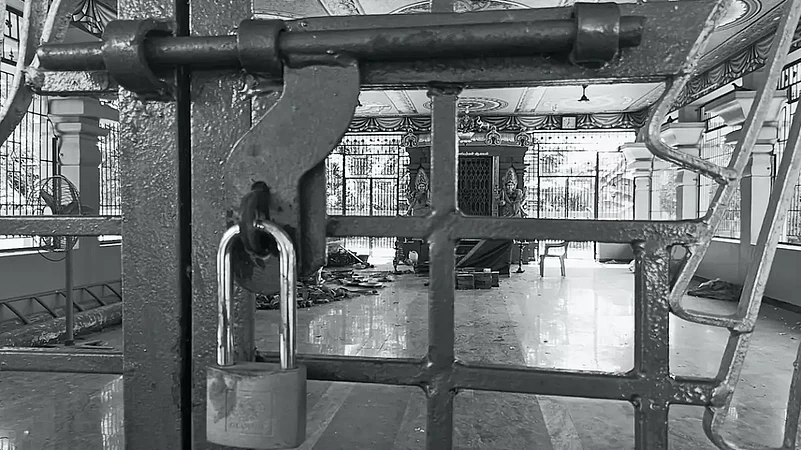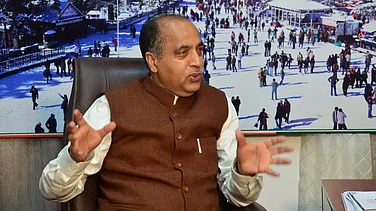Alampallam village in Thanjavur district of Tamil Nadu, nestled amidst the tranquil landscapes and embroiled in the turbulence of caste conflicts, now wears a facade of calmness. The Mazhai Mariamman temple in the village remains closed. The sunlit and dusty pathways that surround the temple—cutting through arid paddy fields and stretches of coconut plantations—remains empty revealing little traces of a tension that persisted for many months.
In Alampallam, the bone of contention between the dominant caste and the Dalits was triggered by the demand of Dalits for entry into the temple. The administration and control of this temple have historically been entrusted to the Vellala community, who occupy the upper echelons of the caste hierarchy, although they are technically a backward caste. The simmering issue of unequal worship opportunities came to a head in February 2023, just before the Kumbhabhishekam festival at the temple. The Dalits in the village primarily consist of landless agricultural labourers, employed in the fields owned by the landlords from the dominant caste. They were resolute in their determination to press forward with their demand for equal rights to worship at the Mariamman temple.
Not only in Alampallam, but across Tamil Nadu, the political visibility that was attained by Dalits through reservations in the Panchayati Raj institutions as well as through increased participation in social and political movements strengthened the negotiations for temple entry and equal rights in worshipping. A number of temples in Tamil Nadu have been facing the heat of the Dalits—conflicts that involved the backward castes and escalated to the point of causing serious law and order issues and prompting police interventions. Some even resulted in the closure of the temples.
Alampallam is home to roughly 950 families, 500 of which are from the Vellala community. Dalits, who are termed as ‘Adi Dravidas’, constitute the rest of the population and live in exclusive pockets. For, Umarani, the president of Alampallam panchayat, who is a Dalit woman, the habit of visiting temples came to a halt when she entered this village at the age of 21 after marriage. “I used to go to the temple in my village before my marriage. I had to stop that habit when I got married and came to this village. I saw nobody questioning it. When my son grew up, he started asking me why we had not been allowed to enter the temple,” says Umarani. Sitting in front of her hut with a thatched roof, she recollects her memories of the bitter experiences of caste discrimination.
A few days prior to the opening ceremony of the temple festival on February 23, 2023, the Dalit community members, under the leadership of Umarani, met the temple committee (of Vellalas) and demanded the right to enter and worship—a complete break of the age-old tradition of keeping the “untouchables” away from the sanctum sanctorum. Apparently, the demand was turned down and a group of Dalit leaders met the district collector and submitted a representation demanding the right to worship. On February 22, the previous day of the festival, the Dalit community in the village held a ritualistic procession and put the flower pots in the newly-constructed Yagashala right in front of the temple. But when the Dalits in the village woke up the next day, they were shocked to see the road leading to the temple from their locality had been fenced. “They had blocked the road at night. The youth of our community cannot tolerate this humiliation and insult,” says Umarani.

However, the police broke the barricades and let the Dalits enter the temple. “During the 48-day-long festival, each family or a group of families were supposed to host food for the people. That was the tradition followed over the decades. “They (the Vellalas) stopped this age-old practice to protest against the Dalits,” says Umarani. “They do not have a problem in changing or stopping a tradition according to their will, but untouchability and oppression against Dalits continues,” says Kalai Shelvi, a native of Thanjavur and an activist of Tamil Nadu Untouchability Eradication Forum, a mass organisation of the CPI(M).
The simmering tension between Dalits and Vellala community has today reached a critical juncture, creating an atmosphere fraught with the potential for an open conflict. The peace talks held by the district collector yielded no results. The temple committee was not ready to give in to the demand for opening the temple for Dalits even for a day, according to Umarani. After a series of litigations, the Dalits managed to get a court order in their favour and the police broke the locks of the temple and let them in.
The retaliation was severe. “They stopped employing us in their agriculture fields. They also imposed a ban on cattle feeding,” says Gomathi, a neighbour of Umarani. A majority of the landless Dalits used to work in the agricultural lands of the backward caste communities. This was a severe blow to the Dalits in the village. “Our people are now forced to work on daily wages in other villages. It is not easy to find work. They also have started forcing us to pay the debts back,” says Umarani.
Most of the Dalit families in the village owe debts to the landlords. “The debts are transferred from generations to generations. Being unable to pay back the money, they pay it back by working for them. It is a form of bonded labour,” says Aruna Devi, a Thanjavur-based lawyer and an activist of the Untouchability Eradication Forum.
The Mazhai Mariamman temple in Alampallam village is not an exceptional case. The Tamil Nadu Temple Entry Authorisation Act of 1947 allows all Hindu castes and classes to enter Hindu temples and worship. Many major temples in Tamil Nadu are open for all, where untouchability is not practiced. But several small temples, especially in the southern districts of Tamil Nadu, remain closed for Dalits.
In recent times, in several districts across Tamil Nadu, temple entry of Dalits has emerged as a fiery and contentious issue that has ignited significant tension between the Dalit communities and the dominant castes. For the first time in 100 years, the Dalits created history by entering in the Mariamman temple at Chellankuppam village in Thiruvannamalai district on August 2, 2023.
The issue was triggered in July this year when a clash occurred between two youths, one belonging to the Dalit community and the other from a dominant caste. These two individuals had been former classmates from the same village, but had since relocated to Chennai for employment reasons. A dispute ignited on the social media between the two regarding the entry of Dalits in temples, ultimately culminating in a physical altercation when they encountered each other in their village. Subsequently, the Dalit group engaged district revenue officials and law enforcement, presenting petitions as an appeal to secure their right to enter the temple premises, which finally resulted in their entry and they were escorted by cops.
On the April 7, 2023, a 21-year-old Dalit youth, Kathiravan, broke the longstanding rule of untouchability by entering the Dharma Raja Draupadi Amman temple located in Melpathi, Villupuram district. This incident transpired on the final day of the temple festival. However, his actions were met with an alleged assault by members of the dominant Vanniyar community residing in the village. Kathiravan and other two Dalit men were allegedly beaten up by the members of Vanniyar community. In response to this assault, the Dalit community raised their voices in protest, leading to road blockades and an atmosphere of heightened communal tension engulfing the village. Law enforcement took the step of sealing the temple, while multiple rounds of peace discussions were conducted. At present, the temple remains closed, and an undercurrent of tension persists within the village, even though no further instances of violence have been reported.
In a similar incident, in January 2023, a group of Dalit men and women entered the Varada Raja Perumal temple at Eduthavainadam village in Kallakkurishi district. It was the first time in the history of the 200-year-old temple that the Dalits broke the practice of untouchability. The district administration extended support to the Dalits who entered the temple. Around 300 police personal were deployed in the temple premises.
The temple entry movement achieved remarkable strides under the leadership of E V Ramasamy, widely known as Thanthai Periyar. This legendary figure in Tamil Nadu history pioneered the ‘Self Respect Movement’, which was a staunch opposition to Brahmin dominance. He founded the Dravidian Movement, which culminated in the inception of the Dravidar Kazhakam (DK) party, later splitting into the DMK and AIADMK. Thanthai Periyar was an advocate of the temple entry movement and played a significant role in the Vaikkom Satyagraha, a temple entry campaign that commenced in 1924 in Travancore (now part of Kerala).
The Other Side
V R T Balasubramanyam, who hails from the Vellala community and serves as the head of the temple committee in Alampallam village, exhibited reluctance when approached by Outlook for entry into his residence. Right from the onset of the conversation, he swiftly dismissed the notion of untouchability and discrimination, presenting a stance of denial.
“The temple is constructed by us. The land where the temple is located also belongs to us. It is our temple. They want a role in the administration of the festival which we cannot allow,” says Balasubramanyam. He argues that denying entry to Dalits is not discrimination, but it is tradition and a custom followed by their ancestors.
The expansive residence of Balasubramanyam and his wife, Kariyathal, a former president of the panchayat, ensconced amidst a cluster of trees, lay a few km distant from the Dalit settlement within the village. Of particular note was the veranda, bedecked with a monumental portrait of E V Ramaswamy, the illustrious torchbearer of the anti-caste movement and the architect of the Dravidian political movement in Tamil Nadu.
Adorning one wall were images of political figures that underscored Balasubramanyam’s political allegiance. These photographs included late Karunanidhi, the former Chief Minister and eminent DMK leader, M K Stalin, Karunanidhi’s son and the current Chief Minister of Tamil Nadu, and Udhayanidhi Stalin, his son and a minister in the government. Interestingly, Udhayanidhi Stalin also played a pivotal role in the recent cinematic sensation Mamannan, a political thriller that emerged as a resounding commercial triumph in Tamil Nadu.
The movie narrates the harrowing tale of violence and prejudice perpetuated by the dominant castes against the Dalits. Udhayanidhi Stalin, portraying the protagonist, is the offspring of Mamannan, a Dalit member of the legislative assembly, portrayed by the seasoned actor Vadivelu. Fahad Fazil, the antagonist, assumes the mantle of the district secretary within the same political party. The narrative revolves around the villain’s repugnant sentiments and the hero’s indomitable resistance.
The stark paradox is clearly noticeable. In a remote village in Tamil Nadu, the leader of a dominant caste, who excludes Dalits from temple precincts, adorns his wall with portraits of leaders who battled against the insidious shackles of caste-based discrimination. Evidently, he lacks any apparent ‘conflict of interest’ with the ruling DMK, thus highlighting the Dravidian parties’ limitations in effectively addressing caste conflicts.
(This appeared in the print as 'Temple Entry Struggle for Dalits')
Shahina K K in Thanjavur, Tamil Nadu


























